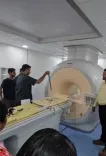How Are Scientists Advancing Real-Time Genome Sequencing to Tackle a Deadly Superbug?

Synopsis
Key Takeaways
- Real-time genome sequencing aids in immediate identification of bacterial mutations.
- This technology facilitates personalized treatments for better patient outcomes.
- It addresses the urgent issue of antibiotic resistance.
- Researchers have collaborated with multiple hospitals for practical implementation.
- Future clinical trials may establish this approach as a standard practice.
Sydney, June 5 (NationPress) Researchers from Australia have achieved a significant milestone in the fight against Staphylococcus aureus, known as golden staph — a superbug responsible for over a million fatalities globally each year.
This groundbreaking initiative is the first of its kind, showcasing that real-time genome sequencing during critical infections enables healthcare professionals to swiftly pinpoint resistance mutations and tailor treatments accordingly, as reported by Xinhua news agency.
This advancement is poised to help mitigate the escalation of antibiotic resistance, according to experts from the Melbourne-based Peter Doherty Institute for Infection and Immunity (Doherty Institute).
In collaboration with seven local hospitals, researchers from the Doherty Institute highlighted that conventional hospital laboratories typically identify bacteria using standard testing methods, which only reveal the species type, providing limited understanding of antibiotic resistance or genetic alterations.
In contrast, genome sequencing offers an extensive genetic profile, revealing mutations that may affect bacterial responses to treatments.
Historically, studies on bacterial evolution were conducted retrospectively, often years after patients had completed their treatments.
This innovative method allows clinicians to observe bacterial changes in real-time, delivering immediate and actionable insights for patient care, as detailed in a study published in Nature Communications.
By analyzing golden staph samples from patients at the onset of infection and during treatment failures, researchers discovered that in one-third of cases, the bacteria developed mutations that rendered standard antibiotics ineffective, according to lead author Stefano Giulieri at the Doherty Institute and the University of Melbourne.
Giulieri noted, "In one instance, after successfully managing a golden staph infection, the patient returned to the hospital two months post-antibiotic treatment. Resistance surged 80-fold within that period, yet genomic insights allowed clinicians to effectively adjust treatment and eradicate the infection.
These results signify a major advancement toward targeted therapies for bacterial infections and pave the way for future clinical trials that could establish this approach as a standard practice in hospitals globally, according to the researchers.









